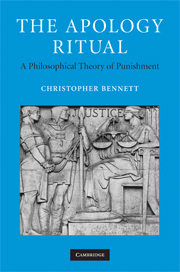5 - The cycle of blame and apology
Published online by Cambridge University Press: 22 September 2009
Summary
retribution and the ‘RIGHT TO BE PUNISHED’ STRATEGY
The overall strategy that I seek to defend in this chapter derives from our discussion of Strawson in chapter 3. There we identified the idea that as agents we participate in relationships that are partly constituted by the responsibilities – to show respect and goodwill – that we have towards one another as members of such relationships. These relationships can in many cases be non-instrumentally valuable, as in the case of friendship, collegiality, shared participation in a MacIntyrean practice, and so on. I argued that part of the responsibility one can have to a fellow participant in such a relationship is to hold her to the responsibilities of that role in the event that she should violate them. Our ‘right to be punished’ strategy argues further that retributive reactions are a necessary part of holding a person responsible and hence necessary in order fully to respect her as a member of the relationship. However, the question with which we ended chapter 3 was whether engaging a wrongdoer in non-retributive dialogue was not a perfectly adequate way of holding members of relationships responsible.
The argument of the last chapter developed our ‘right to be punished’ strategy, again putting forward the claim that various possible modes of interaction with a wrongdoer would not do justice to her identity as a moral agent.
- Type
- Chapter
- Information
- The Apology RitualA Philosophical Theory of Punishment, pp. 101 - 122Publisher: Cambridge University PressPrint publication year: 2008



